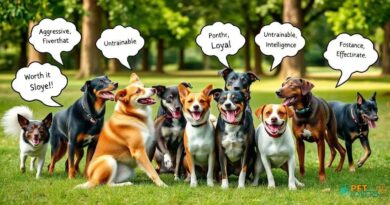What is Jogo de agilidade
What is Jogo de Agilidade?
Jogo de agilidade, or agility training, is a popular canine sport that emphasizes the bond between dogs and their handlers. This dynamic activity involves navigating a variety of obstacles, including jumps, tunnels, and weave poles, all designed to test a dog’s speed, accuracy, and obedience. The primary goal is to complete a course in the shortest time possible while following specific rules and commands.
The History of Agility Training
The origins of agility training can be traced back to the late 1970s in the United Kingdom, where it was initially created as a demonstration for dog shows. Inspired by equestrian jumping events, the sport quickly gained popularity and spread across the globe. Today, agility competitions are held worldwide, showcasing the incredible skills of both dogs and their handlers.
Benefits of Jogo de Agilidade
Engaging in jogo de agilidade offers numerous benefits for dogs and their owners. It provides physical exercise, mental stimulation, and an opportunity for socialization with other dogs and people. Additionally, agility training can help strengthen the bond between a dog and its handler, fostering trust and communication. This sport is also an excellent way to channel a dog’s energy and instincts in a positive manner.
Essential Equipment for Agility Training
To participate in jogo de agilidade, specific equipment is required. Common obstacles include jumps, tunnels, A-frames, seesaws, and weave poles. These items can be purchased from specialized retailers or even built at home using readily available materials. The right equipment ensures a safe and enjoyable training experience for both dogs and handlers.
Getting Started with Agility Training
Starting agility training involves several steps. First, it’s essential to assess your dog’s physical condition and temperament to ensure they are suited for the sport. Next, you can enroll in a local agility class or seek guidance from an experienced trainer. Gradually introducing your dog to the various obstacles will help build their confidence and skills over time.
Training Techniques for Jogo de Agilidade
Effective training techniques are crucial for success in jogo de agilidade. Positive reinforcement, such as treats and praise, encourages dogs to perform tasks correctly. Consistency in commands and practice sessions is vital for developing a dog’s understanding of the course layout. Additionally, handlers should focus on their own movements and body language, as these can significantly influence a dog’s performance.
Competitions and Events
Jogo de agilidade features various competitions and events, ranging from local trials to international championships. These events are often categorized by skill level, allowing dogs and handlers to compete against others with similar experience. Participating in competitions can be a rewarding experience, providing opportunities to showcase training progress and connect with fellow enthusiasts.
Common Challenges in Agility Training
While agility training can be incredibly rewarding, it also presents challenges. Some dogs may struggle with specific obstacles or become distracted during training sessions. Handlers must remain patient and adaptable, adjusting their training methods as needed. Identifying and addressing these challenges early on can lead to a more successful and enjoyable experience for both the dog and handler.
Health and Safety Considerations
Prioritizing health and safety is essential in jogo de agilidade. Regular veterinary check-ups ensure that dogs are physically fit for the demands of agility training. Additionally, handlers should be mindful of their dog’s limits, avoiding overexertion and providing ample rest between training sessions. Proper warm-up and cool-down routines can also help prevent injuries.
Joining the Agility Community
Becoming part of the agility community can enhance your experience in jogo de agilidade. Connecting with other dog owners, trainers, and enthusiasts provides valuable resources and support. Online forums, social media groups, and local clubs are excellent ways to share experiences, seek advice, and stay updated on upcoming events and competitions.




